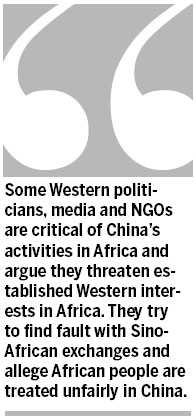Long tradition of friendship
Updated: 2012-07-11 08:00
By He Wenping (China Daily)
|
|||||||||||

More exchanges between China and Africa might give rise to new issues which will need to be handled carefully
The second China-Africa People's Forum, jointly organized by the China NGO Network for International Exchanges, the African Union Commission and several African non-governmental organizations, opened in Suzhou, East China's Jiangsu province on Tuesday.
More than 300 representatives from NGOs, enterprises, media and academic circles in China and Africa are attending the two-day event, which aims to promote cooperation and enhance the partnerships between China and African countries.
A series of activities, including a photo exhibition on China-African friendship, traditional Chinese and African art exhibitions and cultural performances are also being staged during the event.
A declaration was passed at the first China-Africa People's Forum, held in Nairobi, Kenya, in August 2011, outlining the guiding principles of Sino-African non-governmental exchanges. The declaration stressed that "enhancing people-to-people friendship, facilitating pragmatic cooperation and promoting world peace" are the core values of China-Africa non-governmental exchanges.
Friendly exchanges between China and Africa can be traced back 2,000 years, and since the founding of the People's Republic of China in 1949, it has been China's long-term policy to extend support to the people of Africa in their struggle to achieve and safeguard their national independence. By 1960 more than 1,000 representatives and personages from Africa's national liberation organizations, trade unions, students' and women's groups had visited China through non-governmental channels. China offered African countries economic and political assistance without any attached conditions to support the development of their national economies, even when China's economy was struggling. In the 1960s, China signed an aid-offering accord with 12 African countries. The number of beneficiaries had increased to 70 by the end of the 1970s, accounting for more than 90 percent of the African countries at that time. More than 60 Chinese experts lost their lives during the construction of the Tanzania-Zambia Railway and were laid to rest in a foreign land. China's medical teams and agricultural experts who shuttled back and forth across the continent knitted a unique tapestry of Sino-African non-governmental exchanges and friendship.
As bilateral exchanges have further developed over the past decade, the West has taken an increasing interest in Sino-African ties. Some Western politicians, media and NGOs are critical of China's activities in Africa and argue they threaten established Western interests in Africa. They try to find fault with Sino-African exchanges and allege African people are treated unfairly in China. For example, some Western media have tried to use the recent detention of 38 unlicensed Chinese gold miners in Ghana and the death of a Nigerian businessman in Guangzhou, Guangdong province, following a dispute with a local taxi driver, to portray China's activities in Africa as illegal and give the impression that African people are victimized in China. The two incidents are clearly unrelated and should be handled by relevant departments from both sides in an objective and just manner according to laws.
The media from both sides should report such incidents in an objective and truthful manner to forestall possible rumors and distorted reporting by Western media. More importantly, China and African countries should look at their bilateral ties from a long-term and overall perspective and refrain from overreacting.
The Sino-African ties that were consolidated and developed in the process of mutual support in the fight against imperialism and colonialism now encompass politics, finance, culture, education, security, tourism and other areas. Currently, nearly a million Chinese people live or work in Africa and more than 2,000 Chinese companies conduct economic activities in African countries. Similarly, the number of African people coming to China on an exchange or for business or to study has also been on the increase. It is estimated that more than 100,000 African people now live in Guangzhou alone and the figure has increased by about 30 percent on a yearly basis.
With the expansion of mutual exchanges, China and African countries should hold a tolerant attitude toward each other and try to resolve any problems and disputes through consultations instead of in an emotional manner.
The author is a researcher with the Institute of Western Asian and African Studies under the Chinese Academy of Social Sciences.
(China Daily 07/11/2012 page8)
Today's Top News
President Xi confident in recovery from quake
H7N9 update: 104 cases, 21 deaths
Telecom workers restore links
Coal mine blast kills 18 in Jilin
Intl scholarship puts China on the map
More bird flu patients discharged
Gold loses sheen, but still a safe bet
US 'turns blind eye to human rights'
Hot Topics
Lunar probe , China growth forecasts, Emission rules get tougher, China seen through 'colored lens', International board,
Editor's Picks

|

|

|

|

|

|





